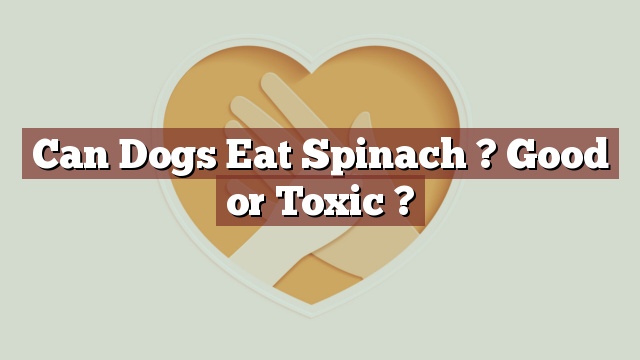Can Dogs Eat Spinach? Good or Toxic?
As pet owners, it is crucial to be aware of what foods are safe for our furry friends to consume. While some human foods can be a healthy addition to a dog’s diet, others can pose significant risks to their health. One common question that arises is whether dogs can eat spinach. In this article, we will delve into the nutritional value of spinach, discuss its safety considerations, and explore the potential risks and benefits of feeding spinach to dogs.
Nutritional Value of Spinach: A Closer Look at the Nutrients
Spinach is a leafy green vegetable that is rich in various nutrients. It contains vitamins A, C, and K, as well as minerals like iron, calcium, and potassium. Additionally, spinach is a great source of fiber, which can promote healthy digestion in dogs. These nutrients contribute to the overall health and well-being of our canine companions.
Can Dogs Eat Spinach? Safety Considerations and Toxicity Risk
The answer to the question "Can dogs eat spinach?" is yes, dogs can eat spinach. In fact, many commercial dog food brands include spinach as an ingredient in their recipes. However, it is essential to take certain precautions when feeding spinach to dogs. While spinach is generally safe, it should be given in moderation and prepared properly to avoid any potential health risks.
Potential Risks and Benefits of Feeding Spinach to Dogs
While spinach can be a healthy addition to a dog’s diet, overfeeding or improper preparation can lead to potential risks. Spinach contains oxalic acid, which can interfere with calcium absorption and contribute to the formation of kidney stones. Therefore, it is crucial to feed spinach in moderation to prevent any adverse effects.
On the other hand, when given in appropriate amounts, spinach can offer various health benefits to dogs. The high fiber content in spinach can aid in maintaining a healthy digestive system and can help manage weight. Additionally, the vitamins and minerals present in spinach contribute to the overall immune system and promote healthy bones and teeth in dogs.
What to Do If Your Dog Eats Spinach: Precautions and Actions
If your dog consumes spinach, it is essential to monitor their behavior and watch out for any symptoms of discomfort or illness. If you notice any unusual signs such as vomiting, diarrhea, or decreased appetite, it is recommended to consult your veterinarian immediately. They will be able to provide you with the necessary guidance and advice based on your dog’s specific situation.
Conclusion: Balance and Moderation are Key in Feeding Dogs Spinach
In conclusion, spinach can be a beneficial addition to a dog’s diet if fed in moderation and prepared properly. It is important to remember that every dog is different, and what may be safe for one dog may not be suitable for another. As responsible pet owners, it is crucial to educate ourselves about the potential risks and benefits of certain foods before introducing them into our dog’s diet. If in doubt, always consult with a veterinarian for professional advice tailored to your dog’s individual needs. Ultimately, a balanced and moderate approach is key to ensuring the health and well-being of our beloved canine companions.
Thank you for investing your time in exploring [page_title] on Can-Eat.org. Our goal is to provide readers like you with thorough and reliable information about various dietary topics. Each article, including [page_title], stems from diligent research and a passion for understanding the nuances of our food choices. We believe that knowledge is a vital step towards making informed and healthy decisions. However, while "[page_title]" sheds light on its specific topic, it's crucial to remember that everyone's body reacts differently to foods and dietary changes. What might be beneficial for one person could have different effects on another. Before you consider integrating suggestions or insights from "[page_title]" into your diet, it's always wise to consult with a nutritionist or healthcare professional. Their specialized knowledge ensures that you're making choices best suited to your individual health needs. As you navigate [page_title], be mindful of potential allergies, intolerances, or unique dietary requirements you may have. No singular article can capture the vast diversity of human health, and individualized guidance is invaluable. The content provided in [page_title] serves as a general guide. It is not, by any means, a substitute for personalized medical or nutritional advice. Your health should always be the top priority, and professional guidance is the best path forward. In your journey towards a balanced and nutritious lifestyle, we hope that [page_title] serves as a helpful stepping stone. Remember, informed decisions lead to healthier outcomes. Thank you for trusting Can-Eat.org. Continue exploring, learning, and prioritizing your health. Cheers to a well-informed and healthier future!

